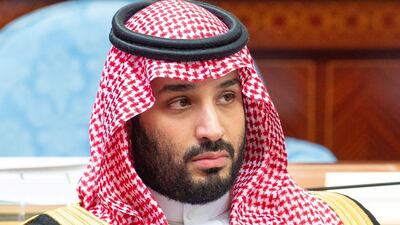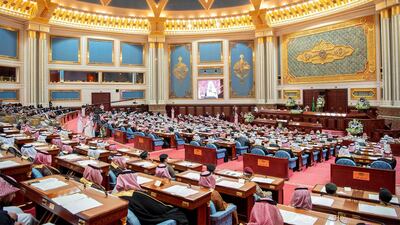Saudi Arabia's King Salman praised his country’s reforms in his annual address on Wednesday, and stressed the importance of his government’s decision to publicly list shares of the state-run oil giant Aramco.
King Salman also used his speech to warn rival Iran against further aggressive acts.
Two key Saudi Aramco processing sites were hit by drones and missiles in September, knocking out almost 6 per cent of daily global crude production.
The attack was claimed by Iranian-backed Houthi rebels at war with Saudi Arabia in Yemen, but the US and Saudi Arabia blame Iran for the attack, an accusation denied by Tehran.
King Salman said Saudi Arabia’s ability to quickly recover and meet global oil demand after the attacks prove “its leading role in ensuring the security and stability of global energy supplies”.
Saudi Aramco is the kingdom’s oil and gas producer, pumping more than 10 million barrels of crude oil a day, or about 10 per cent of global demand.
The kingdom plans to sell 1.5 per cent of the company on the local exchange next month, but the success of the offering is heavily dependent on the contribution of Saudi investors and funds.
The king’s son and heir, Crown Prince Mohammed bin Salman, said the IPO was a way to create new streams of revenue for large-scale projects that could create thousands of jobs for young Saudis.
Saudi Arabia is looking to raise as much as US$25.6 billion from the sale, to become the most valuable IPO in history.
King Salman in his speech again blamed Iran for the attacks on Aramco, as well as others targeting oil tankers around the Arabian Gulf over the summer.
He said Saudi Arabia “adhered to wisdom in confronting these cowardly acts”.
“Iran must realise that it has before it serious choices and that for each there are consequences to bear,” King Salman said.
He said his country did not seek war but was prepared to defend itself firmly against any aggression.
On Yemen, where Saudi Arabia has been at war for nearly five years, King Salman expressed hope that a recent power-sharing agreement in the south of the country “will open the door to broader peace talks”.
He commended his government’s decision to expand tourist visas this year, describing the move as a way to attract investments, create jobs and show the country's heritage and culture.
Previously, visit visas were largely restricted to religious pilgrims, direct relatives of residents or small authorised tour groups.
The monarch’s eight-minute speech was broadcast on state TV and delivered before the consultative Shura Council, senior clerics, ministers and princes.










